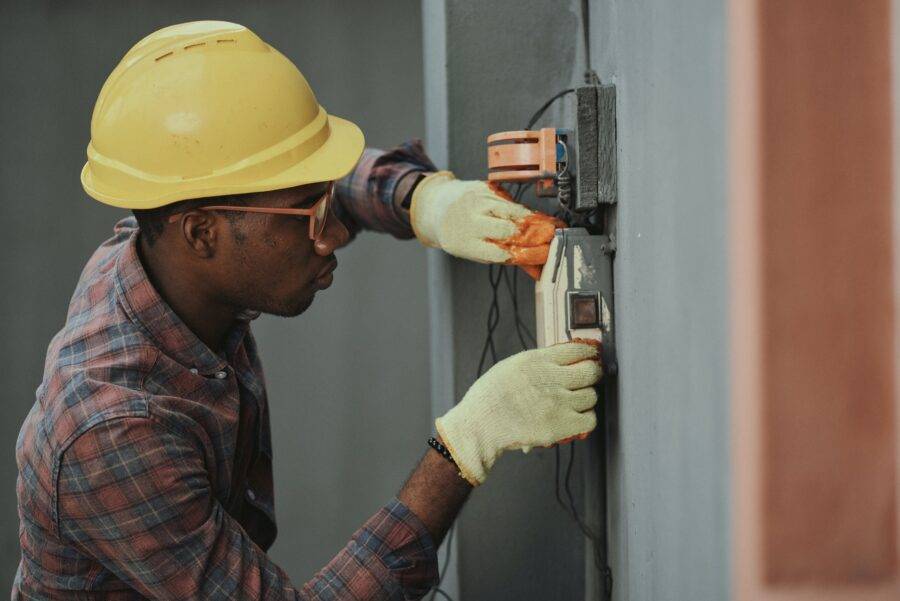Last Updated on July 14, 2024 by Team Experts
In any business facility, employee safety is a vital responsibility of the management. Every facility has some potential hazards that need addressing. Warehouses are no different. Every warehouse has its set of unique safety challenges. But one safety hazard that every warehouse manager needs to keep in mind is electrical hazards.
Warehouses of all kinds have equipment that runs on electricity. Many warehouses have extensive networks of electrical products to facilitate work. Even though electricity is meant to make work more efficient for humankind, it can pose a significant hazard for those who work with it day-in and out. And therefore, safeguarding your workforce against electrical hazards is an essential aspect of warehouse management. Here’s a look at the most common causes of electrical hazards –
- Overloading Circuits – Placing a high electrical demand on a single power outlet or a circuit may cause overloading, overheating, and shocks. Overloaded circuits may also lead to fire hazards or damage the devices plugged into the outlet.
- Torn or Frayed Wires – Torn, or frayed wires pose a significant safety risk. Damaged wires should be professionally repaired or replaced.
- Outlets too Close to Conductors – Electrical outlets should not be placed too close to conductors of electricity like water or metal.
- Failure to Use Electrical Lockout Devices – Electrical lockout devices safeguard people working on electrical equipment or machinery from shocks and fire hazards.
- Careless Employees – Workers who are not careful while working with electrical equipment may endanger their own lives and those of their co-workers.
- Timely Equipment Maintenance – Servicing and maintaining your electrical equipment from time to time helps keep the equipment running well and safe to use.
- Improper Grounding – Lack of safety devices such as AFCI and GFCI that can disrupt the electricity supply when necessary.
The US Congress passed the Occupational Safety and Hazard Act in 1970 to create OSHA. OSHA works not only to impose safety regulations for workers but also to educate both employers and employees about safety at the workplace. Under the Department of Labour, the organization helps to keep workers safe on the job.
Warehouses have a high rate of fatalities and multiple dangers that may prove hazardous for the people working there. OSHA helps ensure the safety of warehouse employees by setting high safety standards. They mandate safe practices and equipment in warehouses that create safer workplaces. OSHA and warehouse owners can work together to protect employees and increase productivity.
Here are seven things to look after to improve electrical safety in your warehouse –
- Timely Maintain Your Electrical Equipment – Preventive maintenance of electrical equipment can help reduce breakdowns and accidents. Find competent people, internally or externally, to inspect and test your equipment periodically.
- Timely Replace Torn or Frayed Wires, Broken Outlets, and Electrical Lockout Devices – Replace and repair all the torn, frayed, or damaged wires in your facility regularly. Follow OSHA safety standards and wiring methods to prevent sparking or short circuits in your facility.
- Install Correct Safety Devices Such as GFCI, AFCI, and Circuit Breakers as Per the Load and Outlet Environment – Invest in high-quality GFCI, AFCI, and circuit braking systems that can disrupt electricity supply case of overload or short circuits.
- Invest in Training and Employee Development – Educate your warehouse management and employees about the hazards of working with electricity. Conduct periodic safety training and assessments to ensure everyone knows how to minimize the dangers of electricity and promote safety.
- Perform a Routine Audit – Performing a regular audit of your electrical system allows you to identify specific areas where hazards exist. Audits will enable you to repair and replace damaged parts and avoid dangers in the future.
- Plan for Severe Weather – Convective systems can significantly threaten severe weather. Safeguard your equipment by unplugging appliances and other electrical items to prevent damages from surges caused by lightning strikes.
- Always use PPE for Electrical Work and Ask Employees to Wear Proper Equipment – Supply personal protective equipment for those who work with electrical equipment to keep people safe on site. For others mandate protective equipment such as hard hats, respiratory protection, eye protection, and gloves.
Electrical safety is an essential aspect of warehouse management and maintaining the safety of your employees. The safety of your work environment is a cyclical process and must be accomplished by establishing a protocol of routine checks and maintenance. Take proactive steps and never overlook electrical safety in your warehouse.
Read more: Six Household Emergencies You Should Be Prepare For

